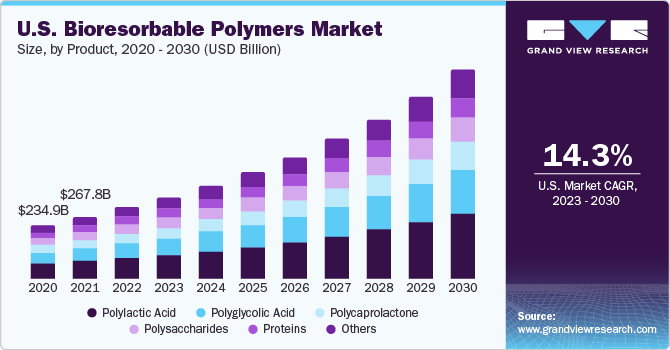The global bioresorbable polymers market was valued at USD 1.30 billion in 2022 and is expected to grow at a compound annual growth rate (CAGR) of 13.8% from 2023 to 2030. The market expansion is primarily driven by a combination of factors, including the rising consumer health awareness, improvements in healthcare facilities, and an increasing number of surgical procedures performed worldwide. According to data from the National Library of Medicine (NLM), around 310 million major surgeries are conducted globally each year, with 20 million surgeries taking place in Europe and 40 to 50 million in the United States. Bioresorbable polymers are a class of materials that can be naturally broken down and absorbed by the body over time, making them highly suitable for medical applications.
These polymers are produced by polymerizing bio-based raw materials through specialized industrial processes. The increasing demand for medical implants, such as cochlear implants, pacemakers, breast implants, and hip implants, is another significant factor driving the growth of the bioresorbable polymers market. As reported by the National Institute on Deafness and Other Communication Disorders (NIDCD), over 737,000 cochlear implants were implanted globally by December 2019. Similarly, the Organization for Economic Cooperation and Development (OECD) noted that hip replacement surgeries increased by 22% between 2009 and 2019, and knee replacements saw an increase of 35% in the same period. This growing need for medical implants is further boosting the market demand for bioresorbable polymers.
Gather more insights about the market drivers, restrains and growth of the Bioresorbable Polymers Market
Application Insights
In 2022, the orthopedics segment emerged as the leading application for bioresorbable polymers, accounting for 43.6% of the total market revenue. This dominance is largely driven by the increasing prevalence of orthopedic conditions such as arthritis, osteoporosis, and degenerative joint diseases, which are exacerbated by factors like an aging population, sedentary lifestyles, obesity, and a lack of physical activity. The rising demand for orthopedic procedures, including knee and hip replacements, is expected to continue fueling growth in this segment.
For example, the National Institutes of Health (NIH) reported that total knee arthroplasty (TKA) was the most commonly performed inpatient surgical procedure in the U.S., with over 1.37 million procedures performed in 2020. The number of TKA surgeries is expected to rise significantly, reaching 3.48 million annually by 2030. Medical products such as screws, sutures, stents, and pins made from bioresorbable polymers are increasingly being used in a variety of medical procedures, including joint repairs and prosthetics. Companies like Evonik Industries AG are developing and offering a range of bioresorbable medical products, such as surgical screws, which are designed to enhance patient care by improving clinical outcomes and reducing the need for additional surgeries. These resorbable implants also help to lower healthcare costs by eliminating the need for secondary removal procedures, a key benefit that is driving their adoption.
Another promising application area for bioresorbable polymers is drug delivery, which is projected to experience the fastest growth during the forecast period, with a CAGR of 15.7%. This growth is largely attributed to the rising prevalence of chronic diseases and the expanding aging population, both of which create a growing demand for more efficient drug delivery systems. Bioresorbable polymers are especially beneficial in drug delivery because they reduce the need for invasive procedures. For instance, implantable devices or sustained-release formulations can help minimize the frequency of invasive procedures, leading to improved patient comfort, reduced healthcare costs, and better therapeutic outcomes.
A notable development in this area occurred in June 2020, when Evonik launched the RESOMER Precise platform, a breakthrough innovation in custom functional polymeric excipients. This platform allows pharmaceutical companies to have unprecedented control over the release profile of parenteral drug products, which is crucial for ensuring consistent and effective treatment. The RESOMER platform, developed using Evonik’s advanced process technology, not only improves the stability of drug products but also helps to mitigate regulatory risks associated with complex drug formulations. This innovation is expected to contribute significantly to the growth of bioresorbable polymers in drug delivery applications, offering enhanced precision and effectiveness in treating a variety of medical conditions.
Order a free sample PDF of the Bioresorbable Polymers Market Intelligence Study, published by Grand View Research.


